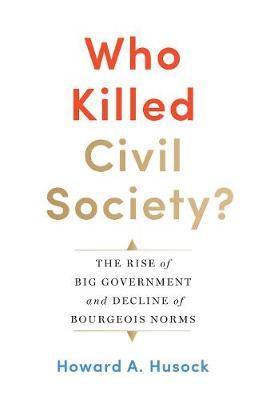Who Killed Civil Society?

Who Killed Civil Society?
In the past, individuals and institutions of civil society actively promoted what may be called "bourgeois norms," to nurture healthy habits so that social problems wouldn't emerge in the first place. It was a formative effort. Today, a massive social service state instead takes a reformative approach to problems that have already become vexing. It offers counseling along with material support, but struggling communities have been more harmed than helped by government's embrace. And social service agencies have a vested interest in the continuance of problems.
Government can provide a financial safety net for citizens, but it cannot effectively create or promote healthy norms. Nor should it try. That formative work is best done by civil society.
This book focuses on six key figures in the history of social welfare to illuminate how a norm-promoting culture was built, then lost, and how it can be revived. We read about Charles Loring Brace, founder of the Children's Aid Society; Jane Addams, founder of Hull House; Mary Richmond, a social work pioneer; Grace Abbott of the federal Children's Bureau; Wilbur Cohen of the Department of Health, Education and Welfare; and Geoffrey Canada, founder of the Harlem Children's Zone-a model for bringing real benefit to a poor community through positive social norms. We need more like it.
PRP: 140.32 Lei
Acesta este Prețul Recomandat de Producător. Prețul de vânzare al produsului este afișat mai jos.
126.29Lei
126.29Lei
140.32 LeiLivrare in 2-4 saptamani
Descrierea produsului
In the past, individuals and institutions of civil society actively promoted what may be called "bourgeois norms," to nurture healthy habits so that social problems wouldn't emerge in the first place. It was a formative effort. Today, a massive social service state instead takes a reformative approach to problems that have already become vexing. It offers counseling along with material support, but struggling communities have been more harmed than helped by government's embrace. And social service agencies have a vested interest in the continuance of problems.
Government can provide a financial safety net for citizens, but it cannot effectively create or promote healthy norms. Nor should it try. That formative work is best done by civil society.
This book focuses on six key figures in the history of social welfare to illuminate how a norm-promoting culture was built, then lost, and how it can be revived. We read about Charles Loring Brace, founder of the Children's Aid Society; Jane Addams, founder of Hull House; Mary Richmond, a social work pioneer; Grace Abbott of the federal Children's Bureau; Wilbur Cohen of the Department of Health, Education and Welfare; and Geoffrey Canada, founder of the Harlem Children's Zone-a model for bringing real benefit to a poor community through positive social norms. We need more like it.
Detaliile produsului










